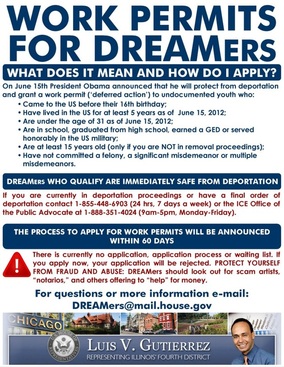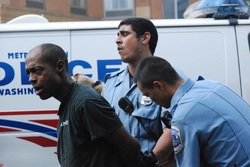
Let's take the example of a 35 year old Dreamer, #DACA expiring Mar 2018. He came to US with his parents at age 4. He has no criminal record, and has never left the US. He goes to see an immigration lawyer his family has been working with for years.
First: Our Dreamer is privileged, because many cannot afford counsel. Though they're maligned as "lawbreakers," the government doesn't provide them lawyers.
OK. Let's figure out how to help our Dreamer!
"Leave and come back legally."
Leaving will trigger a 10 year bar to reentry. A waiver (forgiveness) exists, but our Dreamer doesn't qualify. He has no parents or spouse who are US citizens or green card holders. An uncle is, but that doesn't help. Let's say he has US citizen kids. Well - to qualify for this waiver, hardship to kids doesn't count. He's out of luck.
"Afraid to go back? File for asylum!"
General fear of return is insufficient to win asylum. It must be on very particular grounds. Despite being federal, asylum law doesn't operate the same in all states. Failure to win asylum results in being placed in removal proceedings. And that's if Dreamer had no prior contact with ICE. If he has, he likely has an in absentia order of deportation. That means he would be barred from applying for asylum, unless he can show conditions in his country of origin have changed to create a new type of fear he didn't have before. Filing such a motion, if denied, would put him on the radar for deportation.
"Just wait for the law to change."
Probably the best advice so far; "best" being relative. In the meantime, can't go to school, work legally, or drive. The #DreamAct has failed for 17 years and counting.
"Get married!"
And set down deeper roots into a country refusing to let him stay?
Even if he did, he still needs to win a waiver and return home to reenter. That waiver wasn't allowed to be filed inside the US until 2013. And still need to show hardship to USC spouse. Hardship to our Dreamer is legally irrelevant.
"Don't you have TPS or something?"
Only some Dreamers do; depends on their country. The largest proportion of Dreamers are Mexican and Mexico has never been designated for TPS. (And probably never will.) But this is being taken away by the administration, country by country, determined to leave #dedocumented as many immigrants as possible.
"Go talk to immigration."
In other words, serve yourself up to ICE. Not a good idea. They're not there to help. You're not setting up a payment plan with the IRS. Walk in, and you're on your own, buddy. No lawyer either.
"Ever been a crime victim? Maybe you can get a U Visa."
No, thank God. So no visa for me?
Nope.
Wait...I remember one time my work permit and valid SSN were stolen. I spent months fixing it. Does that count?
No. Not a qualifying crime. Sorry.
"Get your employer to sponsor you."
You're not eligible for a green card inside the US if you have more than 6 months of unlawful presence. So your employer could start the process but you couldn't file for the green card, so what's the point in starting? Also, you can't leave and come back because of 10 year bar. By the way, your employer has to test labor market first and give job to qualified US workers first.
"I'm from El Salvador. I've saved up $120k. Can't I invest and create a business that'll hire US workers?"
No. El Salvador isn't on the treaty investor country list.
"I'm from Honduras. Can I?"
No. Honduras is on the list but unlawful presence prevents you from getting a visa.
"What about the 10 years law?"
No such thing. Please don't listen to rumors on the street or what you read on the Internet. There is no law that prevents you from deportation if you've been here for more than 10 years. One of the dangers lurking for Dreamers and people like them is the bad advice floating around. One of the most persistent rumors is the "10 year law" - that if you're here for 10 years (and, in some versions, have kids here) then you cannot be deported. No such law ever existed.
"What if I serve in the military?"
There was a program called MAVNI that allowed getting citizenship for certain noncitizens with certain skills. But It expired in 2016. The current administration has failed to renew it. So, you can't serve.
"Can't I change status to a student visa?"
No. Unlawful presence requires you to leave. And once you do, you trigger the 10 year bar to reentry. You can't switch to ANY other status, actually. All for the same reason.
"Good news! I found out my grandpa became a US citizen and filed for all of us back in May 2001! I'm good now, right?"
So close, but no. Unlawful presence makes it impossible to qualify for a green card even though you have an approved petition. If it was filed before 4.30.01 you might have been ok under an old law that was never renewed. But May is too late.
"Ok my brother was born here. He can file for me, right?"
Yes, he can file a petition, but no, it won't lead to a green card. You still have to leave. And when you do, you trigger the 10 year bar. You can't get a green card inside the US. Besides, sibling petitions take 13+ years to become current. Filing a petition, then, gives ICE 13 years to find you.
I could go on and on. Immigration lawyers reading this will identify with a lot.
Remember: This isn't your granddaddy's immigration system. It is usually impossible to comply with. It is full of legal pitfalls. One mistake and boom! You're in immigration court fighting to stay.
So before you judge the 800,000-some Dreamers, or the rest of the 11 million plus undocumented population, or the forcibly dedocumented, or the ones currently in legal status struggling to remain so, ask yourself: "Were they given a fair chance to fix their status?"











 RSS Feed
RSS Feed
